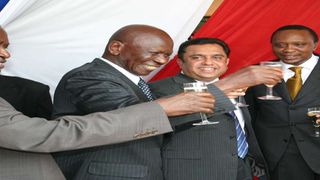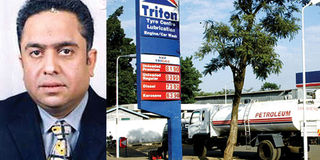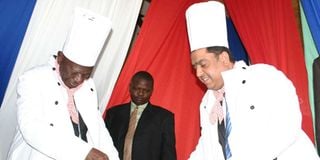
Then Prime Minister Raila Odinga, Vice-President Moody Awori, businessman Yagnesh Devani and Finance minister Uhuru Kenyatta at a function during the grand coalition government. Mr Devani lived large and hobnobbed with the high and mighty in Kenya.
| File | Nation Media GroupNews
Premium
How Devani slipped away from two EACC officials at Heathrow
What you need to know:
- The State accuses the businessman of stealing Sh7.6 billion from the public.
- An order was given by a judge stopping the extradition just as the plane was about to fly out of Britain.
Saturday, January 16, 2021. Two Ethics and Anti-Corruption Commission (EACC) officials, Julius Muraya and Mark Ndiema, sit at Heathrow Airport in London, UK.
They are on the verge of a breakthrough in an infamous corruption case – the Sh7.6 billion Triton scandal.
In their custody is billionaire fugitive Yagnesh Mohanlal Devani, the mastermind of the scandal involving probably the highest amount ever looted in Kenya, and the corruption case which is one the longest in local courts.
Since the case was filed in court in 2009, it has been a hide-and-seek game trying to get hold of Mr Devani, a man who lived large and hobnobbed with the high and powerful.
Once a connected wealthy businessman, Devani left Kenya and has thwarted extradition efforts in Britain, where he has been staying since 2009.
EACC chief executive Twalib Mbarak yesterday told the Sunday Nation that the commission has always been vigilant and has done all it can to have Mr Devani brought back to the country.
“Once it was established that Mr Devani had moved from India, where he first landed from Kenya in December of 2008, to the UK in 2009, a request for his extradition was lodged with the British government,” Mr Mbarak said.
“The UK Crown Prosecution Service took up the case and filed extradition proceedings. Mr Devani opposed his extradition but lost at every stage, including appeals.”
Mr Mbarak said Mr Devani exhausted the British judicial system and appealed to the European Court of Human Rights where he also lost.
Extradition attempt
“This led to the first attempt at extradition in February 2016.
However, Mr Devani lodged a claim for asylum in the UK, opening a window for another judicial process against his surrender to Kenyan authorities,” the EACC chief said.
“The asylum application was rejected by UK courts. He appealed all the way to the UK Supreme Court without success. A decision for his extradition was communicated to Kenya on January 13. Our officers travelled to the UK on January 15.”
Twelve years later, the long arm of the law had caught up with Devani. He was on his way home.
The Directorate of Criminal Investigations (DCI), the Director of Public Prosecutions (DPP) and the Prisons Service had prepared the ground for Devani’s arrival, complete with a press statement.
Unfortunately, it was not to be, as he disembarked from the aircraft following an order by a judge.
How the directive was obtained remains a mystery, as the courts were not open.
It also went against a December 17, 2020 Supreme Court decision quashing an appeal by Mr Devani to block his repatriation.
“Permission to appeal be REFUSED because the application does not raise an arguable point of law,” UK Supreme Court judges David Jones, Mary Arden and Nicholas Hamblen, ruled on Mr Devani’s appeal, effectively ending his pursuit to avoid extradition.

Tycoon Yagnesh Devani. He is the architect of the Sh7.6 billion Triton oil scandal.
Face trial in Nairobi
Director of Public Prosecutions Noordin Haji swung into action immediately.
On January 13, UK Head of Extradition Julian Gibbs said Kenya was free to have Devani face trial in Nairobi.
“I would be very grateful if arrangements could be made as soon as possible to give effect to Mr Devani’s extradition,” Mr Gibbs wrote to Mr Haji.
The letter, seen by the Sunday Nation, was copied to the Kenyan High Commission in London and Criminal Justice Adviser at the British High Commission in Nairobi Jennifer Riddel.
On January 15, Mr Haji wrote to the Ministry of Foreign Affairs and International Trade Principal Secretary requesting the High Commission in London to issue Mr Devani the requisite travel documents.
On the same day, the DPP wrote to the UK Border Force Immigration Team at Heathrow International Airport to allow the EACC officers to take Mr Devani into custody.
“This is therefore to request that you grant the said officers Covid-19 related exemptions pursuant to Rule 16 of Part 2 of Schedule 2 of the Health Protection (Coronavirus, International Travel – England) Regulations, 2020, which allow a representative of any territory to travel to the United Kingdom in order to take into custody any person whose surrender has been ordered in accordance to the United Kingdom Extradition Act 2003,” reads the letter.
In Nairobi, the DPP made a request to the EACC to have its detectives travel to the UK since there were no available officers at the DPP with visas to fly out immediately.
“We cannot wait. We have to get this man,” a senior official at the DPP told the commission,” our sources say.
Prized suspect
This is how Mr Muraya and Mr Ndiema found their way to London.
The UK Metropolitan Police helped deliver the prized suspect to the EACC officers at the airport, where he was chaperoned to a Kenya Airways plane.
Mr Devani’s luggage was loaded and the EACC officers finalised immigration and travel formalities.
Prosecutors in Nairobi had already contacted the Commissioner-General for Prisons and secured a cell for Mr Devani for at least 14 days, in line with Covid-19 quarantine measures, and processing for court appearance.
The DPP had a receiving team and a three-page press statement to be read once Mr Devani landed in Nairobi.
Then the shocker came. As the plane readied for takeoff, the two EACC officers were served with orders stopping them from taking Mr Devani.
It was an embarrassment of momentous proportions on Kenya and the UK.
How that happened on a Saturday morning has baffled Ministry of Foreign Affairs bureaucrats.
There were bitter exchanges in diplomatic circles and within the judicial system of both countries.
Mr Gibbs wrote an apology letter to Kenya on January 18.

Former Vice-President Moody Awori (left) with Yagnesh Devani during a ceremony in 2006 to open Triton’s LPG depot in Nairobi.
Application for asylum
“Mr Devani’s case was on hold due to a further legal matter, which needed to be resolved before extradition could take place. That matter was resolved and arrangements were made for officers to travel to the UK to collect Mr Devani on January 16,” the letter to Kenyan officials says.
“However, on January 16 a UK judge granted an order preventing Mr Devani’s immediate extradition. This followed an application to the court by Mr Devani’s representatives, which was made earlier that same day. Mr Devani could therefore not be extradited.”
“I am very sorry the extradition could not take place and that your officers’ journey to the UK was unsuccessful. The application to the court was not made until after the officers had arrived in the UK.”
Now Kenya will have to wait again for the UK Crown Prosecutor to finalise the new case before having Mr Devani flown to Nairobi for the trial.
In extradition, nations work together in tracking down criminals.
They then send them to face trial in the country the offences are said to have been committed.
“Mr Devani lodged a fresh application for asylum, claiming he had reasons to support the application. Mr Devani was within his rights to renew his application. The commission respects the rule of law and due process locally and in foreign jurisdictions,” Mr Mbarak said.
“We have to wait for this process to be exhausted and ensure that Mr Devani’s extradition is within the law. The commission hopes the process will be exhausted soon and that Mr Devani will be surrendered to Kenya to face trial.”
The EACC chief executive officer said the process is beyond the commission’s control but that EACC has a lot of confidence with British authorities “who have in the past prosecuted this case with zeal and commitment”.





